- Home
- Johnny D. Boggs
Whiskey Kills Page 6
Whiskey Kills Read online
Page 6
Grinning, Daniel knew he might not die this day after all.
“Howdy,” the man said in a thick drawl. “Hoped I could catch up with you boys. Was headin’ down to Wichita Falls myself, and it’s safer than ridin’ alone. You boys don’t mind no comp’ny, do you? Name’s Noble. Harvey P. Noble.” He sprayed the ground with tobacco juice.
“Marshal, eh?” the Ranger said.
“That’s right. Deputy out of Judge Parker’s court in Fort Smith.”
“Listen, Arkansas, we don’t need . . . ,” Blake Browne started.
“Name’s Noble, mister.” The friendliness left Noble’s voice, and his eyes hardened. “That’s Marshal Noble, or Deputy Noble to you.”
“I’m Quantrell,” the Ranger said.
“Quantrell!”
“That’s right. Only it’s spelled with an ‘e’ instead of an ‘i’ . . . Carl Quantrell, Comp’ny D, Texas Rangers . . . but I ain’t shamed by that name no matter how you think. You ask me, Capt’n Quantrill done a lot of good during the war.”
“Reckon there’s plenty of folks who agree with you.” Noble pushed back his hat. “And plenty who don’t.”
Daniel didn’t know anything about any Quantrell, with an ‘e’ or an ‘i’.
Suddenly Noble smiled underneath his bushy mustache. “How you farin’, Daniel?”
“Better,” Daniel said. “Now.”
“You know this buck?” Browne asked.
“I do indeed,” Noble said, and the smile disappeared. “But I can’t say the same of you.”
Browne swallowed. “Blake Browne,” he answered in a hushed voice. “Trader out of Wichita Falls.”
Noble nodded. He pointed at Ranger Quantrell’s Greener. “Ranger Quantrell, would you mind lowerin’ the hammers on that ten-gauge?”
Slowly Quantrell did as he was asked. “Just makin’ sure this Comanch’ didn’t try nothin’,” the Ranger explained.
“That’s good policy,” Noble said, and he reached inside his pocket, withdrew a pencil, which he stuck in his mouth, and then, after some searching, found a note pad. He flipped until he found an open page, and began scratching something on the paper.
“You said Quantrell, right? Comp’ny D. Out of Wichita Falls?”
The Ranger barely nodded.
“Carl with a ‘c’ or a ‘k’?”
Quantrell answered.
“And you’re Blake Black?”
“Browne.”
“Browne. That’s right. You mind spellin’ that for me?”
“What you want my name for? What you want Carl’s name for?”
“Hell, let’s just say I’ll know what name to carve on your cross iffen we gets jumped by Comanch’.”
The Ranger shot a glance at Browne. Both men wet their lips.
“You think those Injuns would jump us?” Quantrell asked.
“Daniel’s right popular with his people. There was a bunch of tribal laws gatherin’ at the agency when I rode up.” He looked over his shoulder, scanning the empty horizon. “Hell, I wouldn’t be surprised if they was hidin’, watchin’ us, right this minute. You’re a Ranger, Quantrell, and you’re a trader, Mister Browne. We got experience. And none of us is too young not to remember how the Comanches often acted before they got penned up on this agency. Now, how do you spell that name again, Mister Browne? My memory ain’t what it once was.”
“B-l-a-k-e . . . B-r-o-w-n-e.”
“Good thing I asked, then. Else I might have spelled your last name without that ‘e’ on your grave marker, or some such.”
Nodding, Noble finished writing, flipped the note pad closed, and returned pad and pencil to his pocket. “Browne with an ‘e’ and Quantrell with an ‘e’ . . . ain’t that a coincidence. I reckon we’d best ride, boys. Light out of this hostile country.”
* * * * *
They camped on the Texas side of Hill’s Ferry, having ridden in silence since Harvey Noble joined the party. Dark clouds threatened rain, blackening out most of the stars and moon. Chained to a post oak tree, Daniel sat away from the campfire Quantrell had started, watching the two lawmen and the whiskey runner eat and drink in silence. Finally Noble rose, let out a loud fart, and filled a cup with coffee, then spooned beans into an enamel bowl.
“I’ll feed your prisoner, Ranger Quantrell,” he said as he walked away.
Noble placed the food and drink in front of Daniel.
“Not really hungry,” Daniel said.
“Coffee’s terrible, and beans ain’t cooked enough, but you best eat, son.” He looked over his shoulder, then sat down, his joints popping. “You got yourself in a peck of trouble, Daniel.”
“Would have been a lot worse if you hadn’t come along.” He decided he was hungry after all, and forked some beans into his mouth.
“Likely.” He looked over his shoulder at the campfire, then leaned forward. “I’d surely like to put a pair of bracelets on Blake Browne, but never been able to catch him.”
“You get the letter I asked Mister Ellenbogen to write you?” Daniel asked, mouth full, forgetting the manners they had tried to teach him back in Pennsylvania.
Noble shook his head. “Nope. Been in the Oklahoma country lookin’ for a rapscallion knowed to hide out on the Canadian River. Likely your letter’s waitin’ for me in Fort Smith.”
If Ellenbogen actually wrote and mailed it, Daniel thought. He said: “You’re a long way from the Canadian.”
“Can’t catch ’em all. No trail. Nobody knows nothin’. Decided to ride back to Fort Smith, but wanted to drop by and see how you was. Good thing, I reckon.”
After a quick smile and nod, Daniel tried some more beans. “I thought you said you were riding to Wichita Falls.”
“I am,” Noble said. “Now. Fort Smith can wait.” He pushed back his hat. “Happened pret’ much like I told them ol’ boys. Rode down to the agency. Found that Ben Buffalo Bone pal of yours and another Comanche lawman. What’s his name? Two Broken . . . ah . . . hell’s fire. Like I told them skunks, my memory ain’t so good no more.”
“Twice Bent Nose?” Daniel asked.
“That’d be the one. I wasn’t lyin’ when I said your pards was likely followin’ us. I told ’em not to, but I suspect they kept an eye on us till we crossed the Red. And I warrant they might have decided to kill them two gents over yonder if I wasn’t with ’em. You got friends, Daniel. I hope you know I’m one of ’em.”
Daniel had to wash down the awful food with stout coffee. “Well, I owe you.”
“Nope. Just doin’ my job. Can’t have nobody committin’ no murder in my territory.”
Daniel tried another bite, then set down the plate.
“You want to tell me just what the hell’s goin’ on here,” Noble said, “and how you got your name on a Texas arrest warrant?”
* * * * *
The last thing Harvey P. Noble told Daniel was that he’d try to find a lawyer. Then he followed the white-haired jailer down the dark hallway, leaving Daniel alone in the cell at Wichita Falls.
Well, not alone. He had three Negroes, two Mexicans, a Celestial, and four other Indians for company, all of whom had ignored Daniel as he found a piece of open floor and settled in for the night.
Noon had passed, and the jailer still had not brought in any grub or emptied the now overflowing slop bucket, and the stench was overpowering. Even the Apache with the yellow headband looked pale.
Across the hall, in a less crowded cell, waited six or seven white men. The prisoners might have been separated by race, but the smell sickened everyone.
Daniel’s eyes watered, his head hurt, and a cramp bit into his calf, when the door opened, and a high-pitched voice yelled: “Killstraight? Daniel Killstraight!”
He pulled himself up, spotted another jailer standing in the door, and nodded.
“Step away from the bars, boy,” the jailer said, rattling a Chicago nightstick on the iron bars as he walked down the hall. “All of you bastards, back up, don’t move, don’t talk.” The s
mell didn’t seem to bother this man. Likely he was used to it. A large key grated inside the lock, and the door pulled open with a squeak. “Outside,” the jailer ordered, and Daniel limped into the hallway, felt the knob of the club push him forward as the door slammed shut. “Your lawyer wants to see you,” the jailer said as he locked the cell.
As they walked toward the light, yells broke out.
“How about some chow?”
“How about emptyin’ these buckets!”
“Where the hell’s my lawyer?”
The jailer didn’t answer.
* * * * *
“My name is Vaughan Coyne.” He was a fair-skinned man, with sandy hair and long whiskers. Maybe thirty. Wearing an ill-fitting sack suit of brown and tan plaid, with a faint scar above his right eyebrow. He held out his hand, and the firm grip surprised Daniel. After a gesture from Coyne, both men sat at a table in the sheriff’s office. One white lawman with a black mustache and the jailer sat across the office, neither showing any interest in the attorney and his client.
“Did Marshal Noble send you?” Daniel asked.
“I have a fondness for Indian cases,” Coyne said. Daniel couldn’t place the accent. Not Eastern, as he had heard in Pennsylvania, and maybe a thousand miles from the Texas and Arkansas drawls he heard so often. “I spent some time at the Standing Rock Agency. It’s a travesty what my people have done to you.” He shook his head, and opened a satchel, withdrawing a large note pad, and some other papers. After laying the papers on the desk, he reached inside his sack suit and withdrew a pair of spectacles, put on the glasses, and read in silence.
After two or three minutes, Coyne looked up. “The complaint says you burned a wagon owned by Blake Browne near Deep Red Run, Greer County. It says you also assaulted Browne with intent to kill. You destroyed his trade goods. That you also tried to kill his employee.” Coyne slowly pulled off the glasses. “Serious charges.”
“He was selling whiskey on the reservation,” Daniel said.
“That would surprise no one. But you couldn’t arrest him. Not on the reservation. Certainly not off it.”
“But I could convince him not to come back.”
“So you’re pleading guilty?”
Daniel didn’t answer.
“Do you know what it’s like in Huntsville prison, Daniel? For an Indian?”
Daniel clasped his hands, and looked away from the lawyer.
“I want to help you, Daniel,” he heard the lawyer say, “but you have to help me, too.”
He thought of this. Looked back at young Coyne. At last, he sighed. “Browne had a wagon full of whiskey. I followed his trail from the Wichita Mountains. I followed him from where he had sold some of his whiskey to a Comanche man named Toyarocho. Toyarocho got drunk. He passed out on top of his daughter, and suffocated her. She was four years old. Four!”
Silence. Then: “I can understand your motive.”
“There’s more.” Daniel’s fingers tightened into fists. “At Huupi, a Comanche camp just north of the Red River, a Penateka Comanche, an old man, drank some of Blake Browne’s whiskey, and died from it. Poisoned.”
“Poison? Are you sure?”
“There was a kitten in his lodge. The kitten had lapped up the whiskey the old Comanche had spilled. The kitten was dead, too. They died the same way.”
What interested Daniel was that the lawyer didn’t take notes. Like he was remembering everything. Daniel was a lot like Harvey Noble, wanting to write everything down on paper.
“Huupi is, I think, a long way from the Wichitas,” Coyne said. “How can you be certain this Comanche and cat died from drinking Blake Browne’s whiskey?”
“The same kind of bottle,” Daniel said. “Coursey & Cox Bottling Works in Dallas. All the bottles Browne had were like that. And when I caught up with those two bastards, Browne said something. Something like . . . ‘You ask anybody from Teepee City to Huupi and so forth that they would vouch for Blake Browne.’ That made me think he had been selling whiskey in Huupi. And, like I said, it was the same kind of bottle. Every bottle in that wagon I burned was the same ceramic stoneware, stamped with the same thing.”
Finally Coyne withdrew a pen from his suit coat, and wrote on one of the papers. A left-hander, Daniel noticed, who wrote really perfect, beautiful letters. Coyne set the pen aside, and stared at Daniel. “But the four-year-old girl, she wasn’t poisoned. Nor was her father. Right?”
Reluctantly Daniel nodded. “I’m not saying all Browne’s whiskey was poison. I don’t know how whiskey works. How it’s made, I mean. I don’t drink it. But on the reservation, I see what it does to The People.”
More silence. The lawyer scribbled some more. When he looked up, he asked: “You burned Browne’s wagon. You don’t deny this?”
“I burned it. I burned all the whiskey he had left.”
“How much?”
Daniel had to remember. “Half of the crates had bottles. No, a little less than half. The other crates were empty.”
“That’s a lot of ginger beer, certainly.”
Daniel waited, then said, shaking his head: “Not beer. Whiskey. Whiskey in beer bottles.”
“I’m sorry,” Coyne said. “Trying to make a joke. Stupid of me. So, let us surmise that he left Wichita Falls with a load of whiskey . . .”
Daniel shook his head. “The bottles were stamped Dallas.”
“Dallas is too far for whiskey runners to operate.”
Daniel had to agree. The lawyer sounded pretty smart.
“He goes up through Huupi,” Coyne said, “then over to the Wichitas, then cuts west. Likely headed for Teepee City, Texas.”
“That’s the town he mentioned,” Daniel said. “Teepee City.”
“A town not known for temperance,” Coyne said. “You caught him at . . .” Putting his glasses on again, he looked back at the papers. “Deep Red Run.” The lawyer leaned back in his chair, chewed on the end of his pen, rocking, staring at the ceiling. “I could hire a guide. If he could find the remains of Browne’s wagon, bring back evidence that proves Browne was selling whiskey . . .” Leaning forward, he slammed the chair legs on the floor, the noise causing the jailer and sheriff to stare at the two men for a moment. “This dead Indian at Huupi. You said he had the same bottle. Did you save this bottle?”
A grimace stretched across Daniel’s face. Idiot. “I threw the bottle at the Texas Ranger’s head at the agency.”
“Maybe there were other bottles in the dead man’s teepee.”
Daniel’s head shook. “The lodge was burned. It is the way of The People.”
Coyne sighed, put his elbows on the desk, and clasped his hands. “Blake Browne is a notorious character. I’d like to rid Texas and Indian Territory of his likeness. Maybe we can do it. Wichita Falls juries have little sympathy for Comanches, but I have my own motives, my own mission, and I hate Blake Browne. And I might be able to . . . should be able to . . . play Greer County against them, but you never know how a judge will act. Let me see what I can do, Daniel.” He almost leaped out of his chair, and stretched a long arm across the table. “I’m your attorney, my friend. Let’s fight these evil-doers together.”
Hesitantly Daniel took the offered hand. Sheepishly he asked: “How much money is this going to cost?”
Chapter Eight
“You’re free to go.”
Daniel stared at the jailer, wondering, not moving. He recalled a half-dime novel he had read back at Carlisle. A Lakota named William had somehow managed to sneak the book into the barracks, and all the boys would laugh as Daniel read the outrageous story to them at night, when they were supposed to be asleep. The Marshal of Magdalena; Or, Vengeance of the Colorado Kid, by a Colonel Something-or-another. The scene that kept coming to mind now was when a mean lawman let the Colorado Kid’s brother out of jail, then shot him in the back.
“You coming, or ain’t you?” the jailer snapped, and Daniel moved into the stinking hallway, letting the old man slam the steel door shut, lock t
he bolt, and shove Daniel forward.
In the office, a deputy handed Daniel his badge, medicine pouch, money purse, and other items they had taken from him when he arrived in Wichita Falls, made him sign a receipt. They offered no explanation, just opened the door—the bright sunlight of late afternoon almost blinding him—and sent him into the streets of Wichita Falls.
No one shot him in the back.
At first, the only person he saw was a lady in a red and white gingham dress, who quickly crossed the wide, dirty street, instead of passing near him. He didn’t blame her. Even if he wasn’t an Indian, she’d likely walk a mile to avoid the stench of the jail that seemed tattooed to his body. Suddenly thinking of a bath, he dug into his pocket and withdrew the money purse, surprised to find his three greenbacks, change, even the gold piece still there.
He wondered if an Indian could get a bath in Wichita Falls, or if he’d have to wash the stink off in the Wichita River. His eyes had adjusted to the daylight, and he could see now.
It was a relatively new town—maybe ten years old, if he remembered correctly—but looked ancient. Looked dirty. The sun and wind aged everything, and everyone, quickly in West Texas. He heard the scream of a locomotive’s whistle, and started walking toward the boardwalk. From what Harvey P. Noble had told him, Wichita Falls had boomed since the arrival of the Fort Worth and Denver Railway Company back in ’82. What once had been home to maybe a dozen families, a Methodist church, and a post office, now was the Wichita County seat, home to hundreds of families, a lumberyard, a shingle factory, and even a sorghum mill. It was the railroad that interested him, although he wasn’t quite sure why.
A voice stopped him.
“Daniel!”
Turning, he saw Vaughan Coyne racing across the street from Kemp’s General Mercantile, dodging a freight wagon, ignoring the bearded driver’s curses, and swinging onto the boardwalk beside Daniel, hugging onto a wooden column to catch his breath. “They let you out already?” he said.
Daniel saw no need to answer.

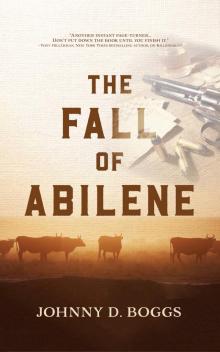 The Fall of Abilene
The Fall of Abilene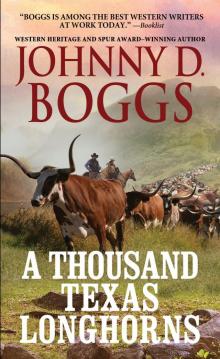 A Thousand Texas Longhorns
A Thousand Texas Longhorns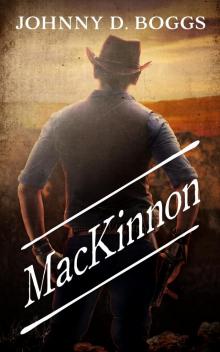 MacKinnon
MacKinnon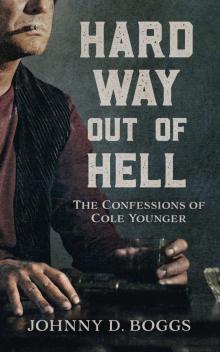 Hard Way Out of Hell
Hard Way Out of Hell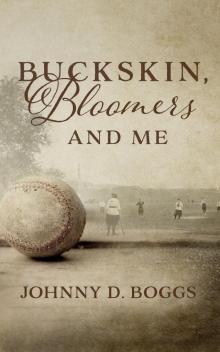 Buckskin, Bloomers, and Me
Buckskin, Bloomers, and Me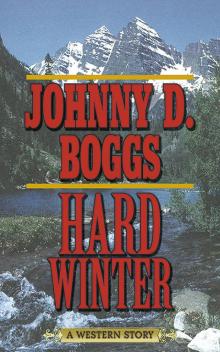 Hard Winter
Hard Winter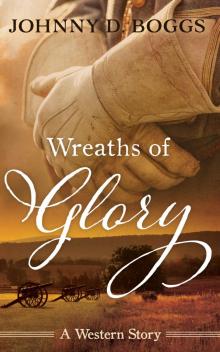 Wreaths of Glory
Wreaths of Glory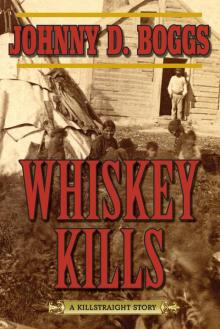 Whiskey Kills
Whiskey Kills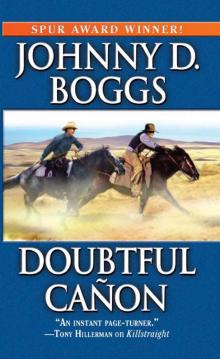 Doubtful Canon
Doubtful Canon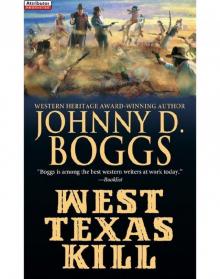 West Texas Kill
West Texas Kill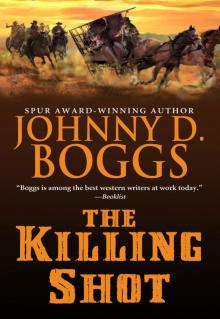 The Killing Shot
The Killing Shot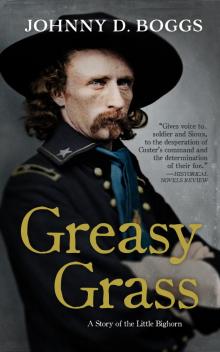 Greasy Grass
Greasy Grass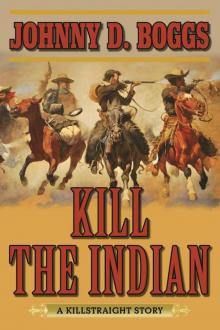 Kill the Indian
Kill the Indian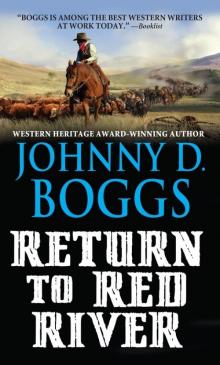 Return to Red River
Return to Red River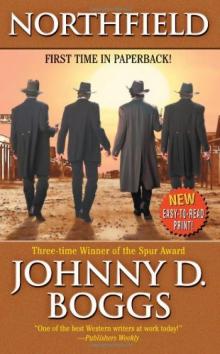 Northfield
Northfield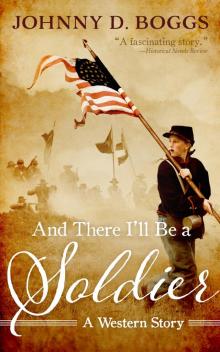 And There I’ll Be a Soldier
And There I’ll Be a Soldier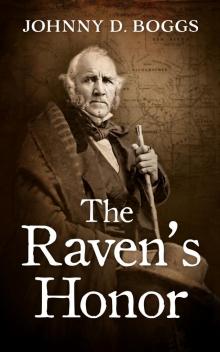 The Raven's Honor
The Raven's Honor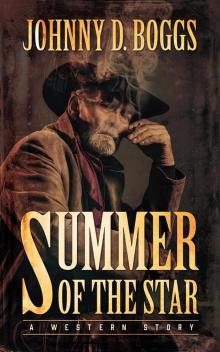 Summer of the Star
Summer of the Star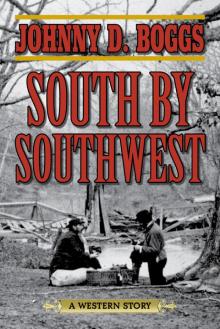 South by Southwest
South by Southwest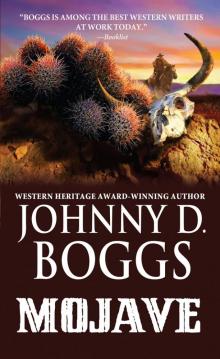 Mojave
Mojave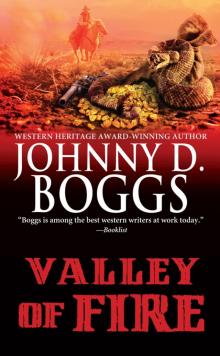 Valley of Fire
Valley of Fire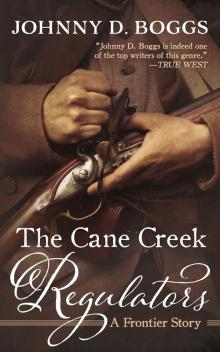 The Cane Creek Regulators
The Cane Creek Regulators